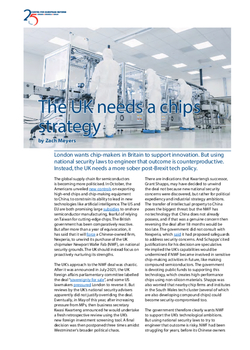
The UK needs a chips strategy
London wants chip-makers in Britain to support innovation. But using national security laws to engineer that outcome is counterproductive. Instead, the UK needs a more sober post-Brexit tech policy.
The global supply chain for semiconductors is becoming more politicised. In October, the Americans unveiled new controls on exporting high-end chips and chip-making equipment to China, to constrain its ability to lead in new technologies like artificial intelligence. The US and EU are both promising large subsidies to onshore semiconductor manufacturing, fearful of relying on Taiwan for cutting-edge chips. The British government has been comparatively reactive. But after more than a year of equivocation, it has said that it will force a Chinese-owned firm, Nexperia, to unwind its purchase of the UK chipmaker Newport Wafer Fab (NWF), on national security grounds. The UK should instead focus on proactively nurturing its strengths.
The UK is indecisive about how to support its chip sector. But at least it has not yet devoted large subsidies to local chip manufacturing, like the EU and US.
The UK’s approach to the NWF deal was chaotic. After it was announced in July 2021, the UK foreign affairs parliamentary committee labelled the deal “sovereignty for sale”, and some US lawmakers pressured London to reverse it. But reviews by the UK’s national security advisers apparently did not justify overriding the deal. Eventually, in May of this year, after increasing pressure from MPs, then business secretary Kwasi Kwarteng announced he would undertake a fresh retrospective review using the UK’s new foreign investment screening tool. A final decision was then postponed three times amidst Westminster’s broader political chaos.
There are indications that Kwarteng’s successor, Grant Shapps, may have decided to unwind the deal not because new national security concerns were discovered, but rather for political expediency and industrial strategy ambitions. The transfer of intellectual property to China poses the biggest threat: but the NWF has no technology that China does not already possess, and if that was a genuine concern then reversing the deal after 18 months would be too late. The government did not consult with Nexperia, which said it had proposed safeguards to address security concerns. And Schapps’ cited justifications for his decision are speculative. He implied the UK’s capabilities would be undermined if NWF became involved in sensitive chip-making activities in future, like making compound semiconductors. The government is devoting public funds to supporting this technology, which creates high-performance chips using non-silicon materials. Shapps was also worried that nearby chip firms and institutes in the South Wales tech cluster (several of which are also developing compound chips) could become security-compromised too.
The government therefore clearly wants NWF to support the UK’s technological ambitions. But using national security laws to try to engineer that outcome is risky. NWF had been struggling for years, before its Chinese owners secured its future by using it for unexciting high-volume manufacturing, rather than trialling new technologies. There is no guarantee the next owner will support new technologies at NWF either – or that such activities will prove economically sustainable. After all, NWF used to have compound chip capabilities, but its previous German owners shifted those facilities to the EU after the Brexit referendum.
If the government wants to nurture the UK’s chip sector, it needs to make investment in it more attractive by developing and sticking to long-term support plans. If London had done so, past owners of NWF might not have abandoned the UK’s innovative ambitions in the first place. Brexit has not helped: it dampened business investment, limited UK firms’ access to European markets and made that access less certain, and has constrained the UK’s access to skilled labour. But successive prime ministers have made the problem worse, for example by subjecting tech policy to repeated reviews, new strategies and changes in direction.
Brexit has already dampened business investment in the UK. But the UK’s febrile post-Brexit politics has made life even harder for UK tech firms.
Chips policy – and the vague plan for the UK to lead the world in compound chip technology – is no exception. Industry has been clamouring for a ‘semiconductor strategy’ since 2020. The government has long promised one, and there were reports that it would publish the strategy alongside its final decision on the NWF deal. But that document is still absent.
When it is eventually produced, the UK strategy should recognise that successful chip firms are globally focused. The chip supply chain is complex and countries succeed where they have comparative advantages (or can afford large and long-term public subsidies). China provides many raw materials, US firms own the main software tools used to design chips, and Taiwan and South Korea dominate cutting-edge manufacturing. Britain has an important place in this value chain. The most successful and most promising UK-based chip companies, like Arm, Imagination and Graphcore, produce designs. Because they are so specialised, crude market share statistics can understate these firms’ importance. While overall it is the US and not the UK which dominates chip design, Arm has incredibly energy-efficient designs for processors. These are indispensable to make devices like smartphones.
Successful British chip firms have not needed UK chip-making factories to test their innovations. Instead, they have developed their own relationships with the world’s largest chip manufacturers. For example, Graphcore works closely with Taiwanese firm TSMC, because Graphcore’s most advanced chips require a bespoke production process which no other manufacturer provides.
These factors mean the government should not fret about protecting domestic chip-making facilities. Instead, its focus should be on creating a stable and supportive policy environment, protecting intellectual property created in Britain, and finding ways to help UK chip designers secure pilot lines to trial cutting-edge technologies at manufacturing facilities overseas. Using national security laws to engineer industrial outcomes is far less effective. Unwinding a deal more than a year after it has been completed only contributes to the UK’s reputation as unpredictable and politically febrile.
The UK's haphazard strategy does have one benefit: so far, the UK has not devoted massive subsidies to local chip manufacturing, like the EU, US and many other countries. The UK is instead focusing on increasing public R&D spending, such as increasing funding for a ‘Catapult’ facility aimed at boosting compound chip technology. This modest approach is wise, if the UK sticks to it. The EU and US plans will be expensive: cutting-edge chip-making plants have extraordinary capital costs, so it is more efficient to have fewer factories and for those factories to have very high output. This is why most cutting-edge production is centralised in Taiwan, and why the most successful manufacturers are independent, making chips for many different design firms. Industry insiders are warning new subsidised factories will contribute to a supply glut. A subsidy race seems likely too: despite the US and EU promising to use their Trade and Technology Council as a forum to co-ordinate subsidies, only three chip-making firms (Intel, Samsung and TSMC) have the technological capabilities to deliver cutting-edge factories, and the skills required to operate these firms are globally scarce. The UK should leave these dilemmas to its larger allies.
London’s decision to unwind the NWF deal reflects the zeitgeist of chip nationalism. But London’s dilemma was particularly acute because NWF had already abandoned the government’s technological ambitions, preferring an unexciting but more financially secure business over supporting riskier innovation. If the UK pursues more stable, long-term innovation policies after Brexit, the government might find itself freer to focus on national security.
Zach Meyers is a senior research fellow at the Centre for European Reform.

